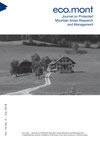Why do people leave marked trails? Implications for managing outdoor recreationists
IF 0.8
4区 环境科学与生态学
Q4 BIODIVERSITY CONSERVATION
Eco Mont-Journal on Protected Mountain Areas Research
Pub Date : 2020-01-01
DOI:10.1553/eco.mont-12-2s33
引用次数: 0
Abstract
Outdoor winter sports activities are growing in popularity, causing conflicts with sensitive wildlife species. Many studies have shown negative effects of recreational activities on wildlife, with off-trail activities considered to be more detrimental compared to activities performed on marked trails. Small hand-held global positioning devices are readily available, facilitating navigation off marked trails. For adequate visitor management, it is essential to know the motives of visitors to nature areas. The motives of recreationists to leave marked trails are, however, rarely known. Using questionnaires, we studied why people leave trails and analysed the predictors according to the Fietkau-Kessel grid model of environmental behaviour. The main motives for leaving a marked trail were more fun compared to staying on marked trails, previous experience of guided tours which left marked trails, and the signs being unclear. High-quality recreation infrastructure significantly reduces the chances of leaving marked trails, and a person with a positive attitude towards wildlife conservation is more likely to stay on the trails. We recommend visitor-steering management that combines attractive recreation infrastructure and clear signposts with methods influencing people’s attitudes towards nature conservation and education to foster on-trail activities. Profile为什么人们会留下标记?管理户外休闲人士的启示
户外冬季运动越来越受欢迎,引发了与敏感野生动物的冲突。许多研究表明,娱乐活动对野生动物的负面影响,与在有标记的小径上进行的活动相比,在小径外进行的活动被认为更有害。小型手持全球定位设备随时可用,方便导航偏离标记路径。为了充分管理游客,了解游客到自然地区的动机是至关重要的。然而,人们很少知道休闲主义者留下痕迹的动机。通过问卷调查,我们研究了人们留下痕迹的原因,并根据环境行为的菲特考-凯塞尔网格模型分析了预测因素。留下标记的步道的主要动机是与留在标记的步道、之前有导游留下标记的步道和路标不清楚相比,留下标记的步道更有趣。高质量的娱乐基础设施大大减少了留下标记小径的机会,对野生动物保护持积极态度的人更有可能留在小径上。我们建议将吸引游客的娱乐设施和清晰的路标与影响人们对自然保护和教育的态度相结合,以引导游客进行管理,以促进远足活动。配置文件
本文章由计算机程序翻译,如有差异,请以英文原文为准。
求助全文
约1分钟内获得全文
求助全文
来源期刊

Eco Mont-Journal on Protected Mountain Areas Research
BIODIVERSITY CONSERVATION-ECOLOGY
CiteScore
1.20
自引率
0.00%
发文量
1
审稿时长
>12 weeks
期刊介绍:
eco.mont offers a platform specifically for scientists and practitioners working in and on protected mountain areas in Europe and overseas.Target audiences of the journal are scientists from all related disciplines, managers of protected areas and an interested public including practitioners, visitors, teachers, etc.
 求助内容:
求助内容: 应助结果提醒方式:
应助结果提醒方式:


